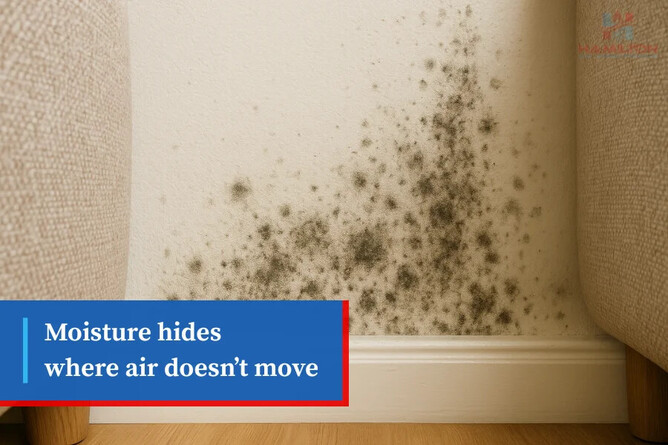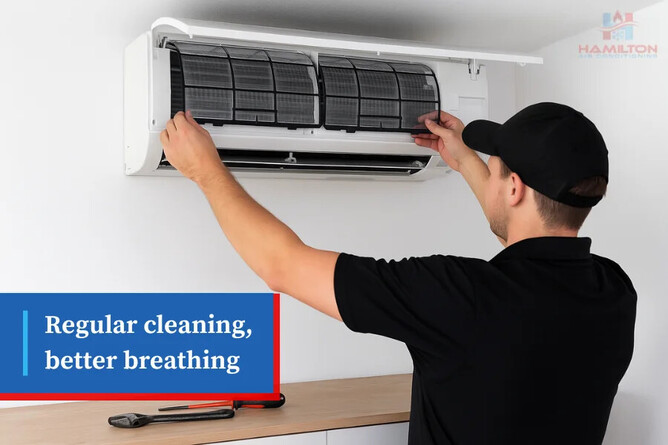Hamilton has a lot going for it—green spaces, a laid-back pace, and a climate that keeps things interesting. But that same climate can also make things a bit tricky indoors. Summers in Hamilton can be surprisingly humid. If you’ve ever stepped into a room and felt like the walls were sweating, you’re not imagining it.
This stickiness doesn’t just make your home uncomfortable—it can lead to mould, musty smells, and a build-up of allergens.
Indoor moisture might seem harmless at first, but over time, it can sneak into carpets, behind furniture, and into the corners of walls, slowly turning your home into a breeding ground for issues you didn’t sign up for.
That’s where heat pumps come in.
While many people know them for heating and cooling, few realise they’re also pretty handy at managing moisture in the air. In this article, we’ll talk about how humidity affects homes in Hamilton and how a well-installed heat pump can quietly make a big difference.
Humidity is simply the amount of water vapour in the air. In Hamilton, the air often carries more moisture than we’d like, especially in the warmer months. When outdoor humidity creeps inside, and there’s not enough airflow or insulation, moisture tends to settle in.
Over time, this dampness can turn into something more than just an annoyance.
When too much moisture builds up indoors, it creates the ideal conditions for mould spores and dust mites. Mould loves to grow in areas where the air stays still and damp—think behind couches, under sinks, or in window sills.
Meanwhile, dust mites feed off humidity and dead skin cells, thriving in bedding and carpets.
Health-wise, this isn’t ideal. Studies from the Building Research Association of New Zealand (BRANZ) have noted the connection between damp homes and respiratory symptoms. It’s not just sneezing and sniffling either. Long-term exposure to mould and allergens can affect breathing, especially for children, older adults, and anyone with asthma or hay fever.
So while a bit of moisture might not seem like a big deal, it adds up quickly—and so do the health and comfort costs if it’s not handled early.

Most Hamilton homes will face high indoor humidity at some point during the year. But unless you know what to look for, it can be easy to brush off the signs or blame them on something else. Here are a few red flags that might pop up if your home’s moisture levels are too high:
Mould in Corners or Behind Furniture
You might first spot small black or green patches, often around window frames, skirting boards, or wardrobes. If left alone, they can spread fast.
Persistent Musty Smells
That “old house” smell isn’t just a quirk. It’s usually a sign that mould or mildew has taken hold somewhere out of sight.
Condensation on Windows
If your windows fog up from the inside, especially in the morning, your home is holding on to more moisture than it should.
Increased Allergy Symptoms
If people in your household are suddenly sneezing more or waking up congested, allergens like mould spores and dust mites might be behind it.
None of these issues scream emergency, but they all point to one thing: your home might be a little too damp for comfort.
Most homeowners install heat pumps for heating or cooling. But in Hamilton, one of the lesser-known advantages is their ability to control moisture levels.
A good-quality heat pump doesn’t just blow air around. It draws in room air, runs it through a coil, and gently removes some of the excess moisture in the process. This function helps regulate the humidity and keep it within a range that’s less friendly to mould and allergens.
When humidity stays between 40% and 60%, most of the problems mentioned earlier start to fade away. And unlike standalone dehumidifiers, which can be bulky and noisy, heat pumps do this job quietly in the background.
Heat pumps also improve airflow, which means moisture doesn’t get a chance to sit still. The constant circulation keeps indoor air moving, helping areas that might otherwise feel stale or damp. And because they maintain a consistent temperature, they reduce condensation on walls and windows, which is a common problem in Hamilton homes during colder mornings.
A study by BRANZ on New Zealand’s indoor environments confirms that homes using mechanical heating and ventilation systems tend to maintain drier, healthier air.
So while they’re known for their ability to warm up a chilly room, their ability to quietly fight humidity is just as helpful—especially in a place like Hamilton.

Once you have a heat pump installed, you might notice a few subtle shifts in your home—and they all point toward better living.
More Comfortable Air
Rooms feel less “sticky,” especially in summer. You can relax without feeling like the air is heavy or damp. This makes a big difference at night when humid air can make sleep uncomfortable.
Better Health
If you or someone in your household deals with asthma or seasonal allergies, breathing becomes easier. With less mould and fewer allergens in the air, your lungs get a bit of a break. Asthma NZ continues to advocate for warm, dry homes as a key part of asthma and allergy management.
Fewer Maintenance Issues
Damp homes can cause problems like peeling wallpaper, warped wood, or stained ceilings. By lowering humidity, you’re helping your home age a little more gracefully.
Lower Long-Term Costs
While there’s an upfront cost with any heat pump, having one that helps manage humidity can save you money on repairs related to moisture damage. It can also reduce the need for additional gear like dehumidifiers or air purifiers.
It’s not a flashy upgrade. But for many Hamilton homeowners, it quietly makes home life healthier and more pleasant, day in and day out.

Getting the most out of your heat pump isn’t about pushing buttons at random. A few simple habits can help keep your home dry and comfortable without cranking up your power bill.
Use The “Dry” Mode
Many heat pumps have a dehumidifying setting, often labeled as “Dry.” It works by running the fan at a lower speed while removing moisture from the air. This mode is perfect during muggy days when it’s not hot enough to need full-on cooling.
Clean The Filters Regularly
When filters get clogged with dust, your heat pump can’t circulate air properly. That limits its ability to pull moisture from the air. Most manufacturers suggest cleaning or replacing filters every few months.
Check The Drainage
Heat pumps collect moisture and release it through a drain. If that drain gets blocked, the unit can’t remove water effectively. Make sure any outdoor drainage isn’t blocked by leaves, dirt, or debris.
Place The Unit in The Right Spot
Installation matters. Heat pumps work best when they’re placed in a central area with clear air pathways. If it’s hidden behind furniture or stuck in a narrow hallway, it won’t move air properly.
Following these steps won’t just help with humidity. They’ll also keep your system running efficiently, which helps keep electricity bills more manageable.
There’s something about Hamilton’s weather that makes heat pumps an especially smart option. While it’s not as rainy as other parts of New Zealand, the city’s mild, damp winters and humid summers mean that indoor moisture is a year-round concern.
Some homes in the area still rely on older heating systems like wood burners or oil column heaters. These might heat the room, but they don’t help with air quality or humidity. In fact, they can sometimes make things worse by increasing condensation or trapping moisture indoors.
Heat pumps, by contrast, keep things balanced. They’re energy-efficient, work well in both cold and warm conditions, and help manage moisture without the need for constant attention.
For homeowners looking to future-proof their property, reduce indoor allergens, or simply stay more comfortable throughout the year, the case for a heat pump is looking stronger by the day.
Humidity in Hamilton homes isn’t just a seasonal issue—it’s a year-round concern that creeps into everyday life. From musty smells to window condensation and everything in between, the effects can quietly pile up.
Heat pumps might not be the first tool that comes to mind when thinking about humidity control. But once installed, they do more than just keep you warm or cool. They help create a healthier, drier, more breathable home. That means fewer mould patches, fewer allergy flare-ups, and less wear and tear on your property.
If you’re thinking about making your home feel better all year round, it’s worth talking to someone who knows Hamilton’s climate and homes inside out. Hamilton Aircons can help you choose the right heat pump and get it set up the right way—no guesswork required.